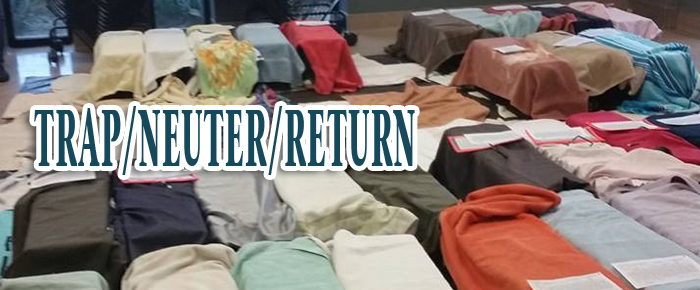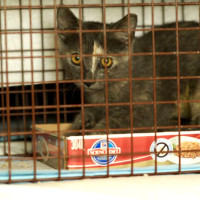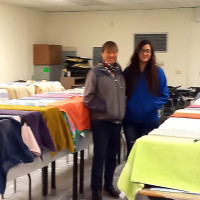
By Janet McAfee
You might see these lovely feline creatures sunning themselves in vacant fields or spot groups of them scurrying through restaurant parking lots. They might include mother cats with adorable kittens, wide eyed and frightened at the sight of humans. They are the feral cats, also known as “community cats” living without human custodians, but carving out a life bonded to their respective group. While their lifespan is shorter than house cats, they live in colonies enjoying the great outdoors and the company of their fellow felines.
Some are abandoned pets, while others were born in the wild. One pair of breeding cats producing two or more litters a year can produce 420,000 offspring over a seven year span. The cat overpopulation problem carries a hefty price tag statewide in California with over $50 million tax dollars spent by animal control and shelters for cat related expenses.
Often unsocialized, these community cats are doomed to be euthanized if taken to a public shelter by animal control or citizens who ignorantly bring the there. Without a foster home, underage puppies and kittens (under 8 weeks old) are routinely euthanized in public shelters. Shelters don’t have the staff to provide the 24-hour care they require. Unwanted felines crowd public shelters and 80% of them will not make it out alive.
TNR is the amazing program with a solution to the cat crisis. Standing for TRAP/NEUTER/RETURN, it proposes a solution that is humane for the animals and saves tax dollar funding for animal control services. A well-managed TNR program traps cats living in outdoor colonies or groups, neuters and spays them, and then returns them to their territory where caretakers provide them with food. While the cats are under anesthesia, their left ear is “tipped” to make it easy to identify them as “fixed”.
On the weekend of January 27, an amazing coalition of local organizations and individual cat lovers came together and conducted a massive TNR in Indio. Coordinated by Mary Ewing of Loving All Animals, a group of dedicated women cat trappers worked alongside 25 Indio High School students to successfully capture, sterilize, vaccinate, and return 84 cats to their respective locations. SNIP parked their mobile spay and neuter vehicle on the campus, and the cats recovered in a nearby classroom. The SNIP vehicle reached full capacity when 50 captured cats were brought in. The Palm Springs Animal Shelter came to the rescue, sterilizing an additional 34 animals.
Mamie Powell, Agriculture teacher at the high school, was eager to have her students participate. The students are enrolled in the Animal Services career pathway. Mrs. Powell describes the weekend, “The students checked in the traps the first night, distributing them to the trappers who went out into the community to trap. When they were returned with cats inside, the students set them up with food, water, and litter boxes. The students returned the next morning to transport the cats for scheduled appointments in the mobile spay unit. They got to watch the veterinary teams perform surgeries, a fantastic learning experience.”
Cat trapper Lauren Blachley reports, “It was after dark when we went out to the neighborhoods where the cats congregate. We trapped some who already had clipped ears, and they were let go. It’s inhumane to take these animals to the shelter where they will certainly be euthanized. A TNR program is the best way to solve this problem.” This dedicated network of women share a love for animals and are determined to make a difference for them.
A Facebook page “TNR Coachella Valley” chronicles the activities of our local cat trappers. If you are interested in helping with TNR, contact Mary Ewing at Loving All Animals at (760) 834-7000. To donate funds for the TNR spay and neuter effort, go to www.lovingallanimals.org and designate “Whiskers & Purrs, TNR” as the reason for your donation.
Jmcafee7@verizon.net











































